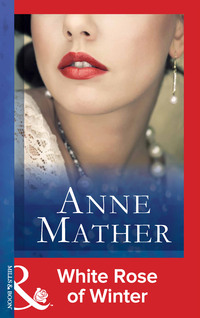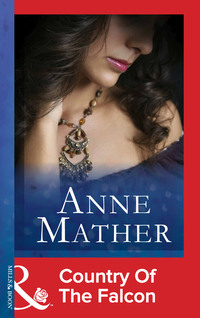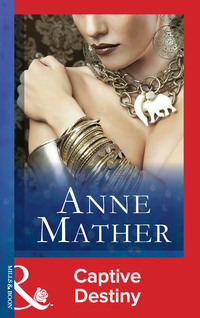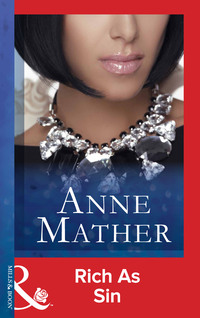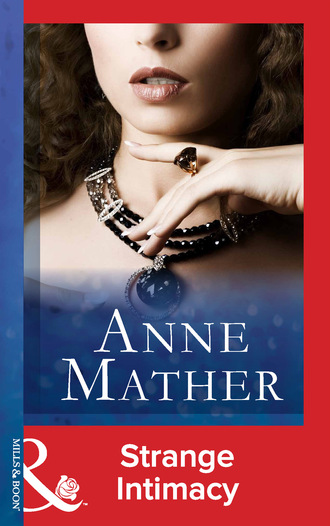
Полная версия
Strange Intimacy

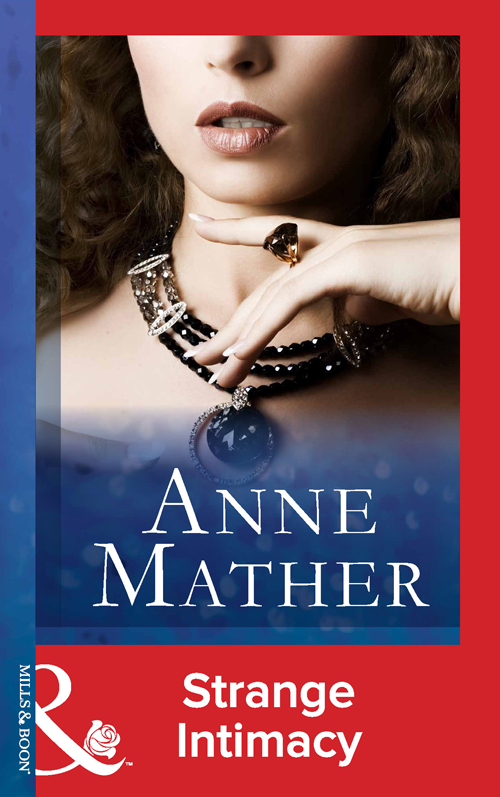
Mills & Boon is proud to present a fabulous
collection of fantastic novels by
bestselling, much loved author
ANNE MATHER
Anne has a stellar record of achievement within the
publishing industry, having written over one hundred
and sixty books, with worldwide sales of more than
forty-eight MILLION copies in multiple languages.
This amazing collection of classic stories offers a chance
for readers to recapture the pleasure Anne’s powerful,
passionate writing has given.
We are sure you will love them all!
I’ve always wanted to write—which is not to say I’ve always wanted to be a professional writer. On the contrary, for years I only wrote for my own pleasure and it wasn’t until my husband suggested sending one of my stories to a publisher that we put several publishers’ names into a hat and pulled one out. The rest, as they say, is history. And now, one hundred and sixty-two books later, I’m literally—excuse the pun—staggered by what’s happened.
I had written all through my infant and junior years and on into my teens, the stories changing from children’s adventures to torrid gypsy passions. My mother used to gather these manuscripts up from time to time, when my bedroom became too untidy, and dispose of them! In those days, I used not to finish any of the stories and Caroline, my first published novel, was the first I’d ever completed. I was newly married then and my daughter was just a baby, and it was quite a job juggling my household chores and scribbling away in exercise books every chance I got. Not very professional, as you can imagine, but that’s the way it was.
These days, I have a bit more time to devote to my work, but that first love of writing has never changed. I can’t imagine not having a current book on the typewriter—yes, it’s my husband who transcribes everything on to the computer. He’s my partner in both life and work and I depend on his good sense more than I care to admit.
We have two grown-up children, a son and a daughter, and two almost grown-up grandchildren, Abi and Ben. My e-mail address is mystic-am@msn.com and I’d be happy to hear from any of my wonderful readers.
Strange Intimacy
Anne Mather

www.millsandboon.co.uk
MILLS & BOON
Before you start reading, why not sign up?
Thank you for downloading this Mills & Boon book. If you want to hear about exclusive discounts, special offers and competitions, sign up to our email newsletter today!
SIGN ME UP!
Or simply visit
signup.millsandboon.co.uk
Mills & Boon emails are completely free to receive and you can unsubscribe at any time via the link in any email we send you.
Table of Contents
Cover
About the Author
Title Page
CHAPTER ONE
CHAPTER TWO
CHAPTER THREE
CHAPTER FOUR
CHAPTER FIVE
CHAPTER SIX
CHAPTER SEVEN
CHAPTER EIGHT
CHAPTER NINE
CHAPTER TEN
CHAPTER ELEVEN
CHAPTER TWELVE
CHAPTER THIRTEEN
CHAPTER FOURTEEN
CHAPTER FIFTEEN
Copyright
CHAPTER ONE
ISOBEL wasn’t precisely sure when she decided she had made a mistake.
She had had doubts in the beginning, of course. But she had managed to dismiss them as cold feet. It was quite a step, moving from the familiar surroundings of the flat in Earl’s Court to the Highlands of Scotland. Even if she was going at the invitation of a friend. Even if there was a job waiting for her, and a comfortable house, into the bargain.
Cory thought she was mad. And perhaps, without her daughter’s constant carping, Isobel might have thought so, too. But, contrary to popular opinion, Cory’s attitude had only served to convince her she was doing the right thing. Anything that would remove her thirteen-year-old daughter from the unhealthy influences of the crowd she was running around with at school couldn’t be all bad.
Nevertheless, Isobel had faced the prospect of the move with some trepidation. In fact, since Edward passed away, she had faced most problems that way. For so long, he had insisted on making any decisions for her, and uprooting herself and Cory from the only home her daughter had ever known was quite an undertaking.
But then, no one had expected Edward to die. At forty-five, he had many years ahead of him, she had assumed. He hadn’t been a drinker; he hadn’t smoked; he had been a pillar of the community. And his mother had pronounced—without hesitation, when Isobel had first broached the possibility of their moving to Scotland—that it was a pity she, Isobel, hadn’t been driving, when the jack-knifing wagon had smashed through the barrier on the M25, killing Edward, but leaving Isobel with only minor cuts and bruises. After all, Edward had still had so much to do with his life, whereas she hadn’t even tried to share his faith.
Which was true, Isobel had admitted—though silently, to herself. And it was something she had berated herself for many times since Edward had died. Her unwillingness to accept the Jewish faith had been the source of so many arguments between them. But, although she supported any and every charitable cause they espoused, and she had many Jewish friends, her own feelings were too ambivalent to make such a momentous decision.
Besides, she had never believed that religion, of any persuasion, was more important than human compassion. Her childhood had been spent travelling with her father, from one impoverished part of the world to the other, and he had always maintained that faith in oneself was more important than faith in some mythical god. Isobel didn’t know if she believed him either, but she was sufficiently persuaded to give both beliefs a chance.
Edward, however, had had different views, although at the time of their marriage he had assured her he would never force her to do anything. But fourteen years, and numerous arguments, later, Isobel had been obliged to accept that his promises had been ambivalent, too.
And it was the main reason why she and his mother had never got on. Or was that carrying understanding a little too far? Mrs Jacobson had never wanted her son to marry anyone. She had been quite happy caring for him, and making his life comfortable. An orphaned teenager, without a penny to her name, who had been trying to come to terms with her father’s death at the time, had never figured in her scheme of things.
Looking back, as she had done many times in the months since Edward died, Isobel had had to admit that maybe Mrs Jacobson had had a point. Perhaps he had been too old for her. Perhaps she had been looking for a replacement for her father. Whatever, the years they had spent together had been mostly happy. At least as happy as most of their friends within their cloistered community.
Edward’s sudden demise had been a blow to all of them—even Cory, who had spent the last two years of her father’s life doing everything she could to frustrate him. Ever since she’d left the private school, which Mrs Jacobson had insisted on her attending, and started at the local comprehensive, she’d become a problem. Of course, Edward’s mother had maintained it was because Isobel had deprived her of her identity, by putting her into the state-school system. Isobel—and Edward, when he wasn’t being brainwashed by his mother—had called it something else.
Sheer bloody-mindedness, Isobel had opined, when for the umpteenth time Cory’s headmaster had reported on her daughter’s delinquency. Playing truant, using bad language, indulging in petty shop-lifting—Cory had been found guilty of them all. Far from trying to get good grades, and maybe even get to university, as Isobel had once hoped to do, Cory had done everything she could to upset her parents. And, what was more, she wasn’t ashamed of it. She actually enjoyed the notoriety it gave her.
Occasionally, Edward had worried that perhaps they should have allowed his mother to go on supporting Cory in private education. But Isobel had persuaded him otherwise. Mrs Jacobson’s influence on their daughter’s life had already been untenable, with Cory quoting her grandmother’s words whenever she didn’t get her own way.
Edward’s death, ten months ago, had given Isobel a brief breathing space. In the vacuum of their shared grief, she and Cory had been closer than they’d been for years. Isobel had even begun to hope that some good might come from Edward’s accident. That Cory had begun to realise how short life could be. And it might have happened, if Mrs Jacobson hadn’t chosen to interfere again.
Until Edward’s death, Isobel had had a part-time job, in a local solicitor’s office. Because she had married so young, and become pregnant almost at once, she had been forced to wait until Cory started school to learn the most basic secretarial skills. Edward had never wanted her to work anyway, and only the fact that Cory’s clothes and shoes were so expensive had enabled Isobel to persuade him that she should get a job.
And Isobel had enjoyed it. She didn’t enjoy spending her days attending her mother-in-law’s coffee mornings, or listening to her mother-in-law’s friends gossiping about anyone who didn’t conform to their strict code of conduct. Isobel had no doubt that she herself had suffered the same fate, once she started working for Gordon Isaacs. But her hours were flexible, and she was always there when Cory came home from school.
Edward’s death had changed things, however. In the new, tougher financial circumstances in which she had found herself, Isobel knew a part-time job would not be enough. The insurance Edward had left would barely cover the mortgage on their apartment. And what with food and light and heating, all subject to inflation, she knew she needed full-time employment to cover all their expenses.
That was when Mrs Jacobson had suggested they move in with her. Her house, a rambling Victorian mansion, in St John’s Wood, was far too big for one person, she said. There was no earthly need for Isobel to work, when everything she owned would come to Cory on her death anyway. She’d be glad of the company—and the help about the house—and she was sure it was what Edward would have wanted.
Isobel had panicked then. There was no other word for it. The idea of moving in with her mother-in-law, and becoming an unpaid servant in her house, was something she couldn’t even countenance. Perhaps she was unkind; perhaps she was ungrateful; perhaps she was foolish! But Isobel knew there was no way she could accept such an arrangement. Cory was hard enough to control as it was. With her grandmother’s support, she would become downright impossible.
And that was only part of it. Isobel knew she would never be allowed to live her own life in that house. Without a job, without friends, without independence, she would have no life at all. It just couldn’t happen. She was sure she’d go mad.
And just when she was at the end of her tether—when Mrs Jacobson had started bribing Cory with expensive CDs and other presents, with promises of holidays in the United States, and the chance to decorate her own room when she came to live with her grandmother—Isobel had run into Clare Webster in Oxford Street.
She and Clare had been at school together. By the time she was fourteen, her father had decided that the peripatetic type of education he could give her, as an antiquities professor, was not enough. In consequence, he had enrolled her at a good boarding-school for girls in Sussex, and although Isobel had protested her father’s word was law.
Besides, after a few weeks, she had started to like it, and her father’s promise that if she worked hard and got the necessary qualifications he would allow her to work with him had been a very potent incentive. And she had found a good friend in Clare, the daughter of a London surgeon, at whose home she had always been made welcome.
But time, and circumstance, had not decreed that their friendship should last beyond their schooldays. Clare’s father was a Scot, and when his own father, a country practitioner, had been taken ill Dr Webster had transferred to a hospital in Glasgow, so that he could be nearer his parents.
That had happened just weeks after the two girls had left school, and less than a month after Isobel’s eighteenth birthday. But Isobel had been preparing to go to South America at the time, to join her father for a year’s sabbatical, before continuing her studies at Oxford, and she had been too excited about her own future to worry about missing Clare. It was only when news came that her father had been killed in a rock-fall that she realised how isolated she was. She had no close friends, no relations, and precious little money. In the depths of her grief, she had been forced to get a job in Sainsbury’s to support herself, and all her hopes for the future had been buried in Yucatan.
That was why, when she met Clare in Oxford Street, it had seemed so prophetic. It had been almost fourteen years since they’d seen one another, and although, in the beginning, they had kept in touch by letter, the passage of time had eroded even that connection.
But Clare had recognised Isobel at once, even if Isobel had not been quite so sure. But the expensively clad woman in fine tweeds and pearls bore little resemblance to the plump teenager Isobel remembered, and it was soon obvious from Clare’s attitude that she had married rather well.
Her insistence that they go somewhere and have lunch, so that they could catch up on one another’s news, had initially aroused a polite but fairly uncompromising refusal. She was due back at the office in less than half an hour, Isobel had explained, not altogether regretfully, in no mood to listen to Clare going on about the difficulties of getting a taxi in London these days. Isobel couldn’t remember the last time she had ridden in a taxi, and with the prospect of another round with Mrs Jacobson that evening looming on the horizon she was desperate to think of some way to head off another confrontation.
But Clare wouldn’t take no for an answer, and her sudden reversion to the girl Isobel remembered had her agreeing to ring Gordon and beg an extra hour. It was a rather special occasion, she’d consoled herself, and perhaps Clare might have an idea as to how she could extricate herself from Mrs Jacobson’s clutches.
And she had. Amazingly, Clare had had the perfect answer to her problems. Her father, who had given up his hospital duties when his father died, and taken the senior Dr Webster’s place in Invercaldy, required a competent secretary. Until recently, he had made do with the rather elderly retainer, who had worked with his father for the past forty years. But now Miss McLeay had retired and gone to live with her sister in Dundee, and her job, and the comfortable cottage she had occupied, were both vacant. And Clare had insisted that her father would offer the job to Isobel in an instant if he thought she’d take it.
Isobel had not been so convinced; not then. The very idea of changing not only her job, but her whole way of life, was decidedly daunting. And, despite Clare’s reassurances, she’d doubted it was that easy. In Isobel’s experience, jobs, and houses, were not freely available. Certainly not in London, anyway. People wanted qualifications, and references; and what about other applicants? Not to mention the landlord of the property, who might have other plans for its disposal.
But Clare had cut through her protests. The village—Invercaldy—practically belonged to her husband’s family, she’d declared. Her husband, Colin Lindsay, was brother to the present Earl of Invercaldy, and in consequence she had no hesitation offering the job—and the cottage—to Isobel.
Even so, Isobel had demurred. The idea was attractive, there was no doubt about that. Moving from the grimy streets of London to the clean mountain air of the Highlands of Scotland sounded like heaven. But she was practical enough to know that living in unfamiliar surroundings, far from everything she had known these past fourteen years, was something of a pipedream. Besides, there was Edward’s mother to consider. She might not like her much but she was Cory’s grandmother.
Promising Clare she would think it over, she had gone back to work with a real feeling of regret. It would have done Cory good to get right away from all the unfavourable influences of London. She was already afraid of what the future might hold.
And then, when she’d arrived home that evening, everything had exploded. She’d come into the flat to find Cory hunched sulkily in a chair, and Mrs Jacobson on the phone, talking agitatedly to whoever it was on the other end of the line.
But, although she’d attempted to get her daughter to tell her what was going on, Cory wouldn’t answer her. And pretty soon Isobel had got the picture. It became obvious from Mrs Jacobson’s speech that she was speaking to the headmaster of the school which Cory attended, and before she could ask what was happening she heard Edward’s mother telling the man that she was withdrawing her granddaughter from the school.
She had tried to take the phone then, but the other woman wouldn’t let her, and short of causing the kind of scene she knew would be reported in the staffroom Isobel could only seethe in silence. But when Mrs Jacobson had eventually put down the receiver and announced that Cory would be attending a private girls’ school in St John’s Wood from now on; that, as they would be moving to Momington Close, it would be more convenient anyway, Isobel had blown her top.
She hadn’t intended mentioning the job in Scotland. During the afternoon, and on the way home, she had decided she would have to rough it out as best she could. But when Mrs Jacobson had informed her that, as Isobel had no control over Cory, she was taking charge of her granddaughter, Isobel had known she had no choice.
The row that followed had been messy, and Isobel would have preferred not to have had it in front of her daughter. The news that Mrs Jacobson’s decision had been precipitated by learning that Cory had been caught sniffing glue behind the bike sheds was worrying enough, without having her own character questioned into the bargain. And then, when Isobel had tried to take the heat out of the situation by mentioning the offer of the job in Invercaldy, Edward’s mother had made that damning statement about Edward’s death. That Isobel had always known Mrs Jacobson blamed her for the accident was bad enough; to be told she’d be better dead was something else.
And so, in spite of Cory’s tears, and Mrs Jacobson’s recriminations, Isobel had phoned Clare at Claridge’s and accepted her offer. Hearing that Mr Webster was more than happy at the prospect of meeting her again was some consolation, and when they boarded the Glasgow train at King’s Cross some three weeks later Isobel had felt confident she had made the right decision. Besides, it wasn’t an irretrievable one, she’d told herself. If things didn’t work out, they could still come back to London. The apartment might be in the hands of an estate agent, but once it was sold their money would be invested, and they could always start again.
And, initially, as the train sped north through rural England, basking in the sunshine of an unseasonably warm September day, Isobel was able to ignore Cory’s sullen face, and enjoy the journey. After all, until her father died, she had spent her life living in different places. Just because she seemed to have put down roots these past fourteen years didn’t mean she couldn’t pull them up again.
And it would be good for Cory, once she stopped feeling sorry for herself. Apart from a couple of holidays in France, she had hardly travelled at all. She knew virtually nothing about England, let alone Scotland, and it was time she stopped thinking that London was the centre of the universe.
It was about the time the train started to run through the Glasgow suburbs that Isobel conceived the fact that, in spite of everything, she wasn’t sure she had done the right thing, and by the time they pulled into Glasgow Central she was convinced she had made a mistake. Cory had scarcely spoken the whole journey, and then only when Isobel had spoken to her first. The tears and tantrums she had indulged in, in an effort to make her mother change her mind, had given way to an aggrieved silence, and with every succeeding minute she had made it plain that she would never accept the moral limitations of living in a small village. She would be a misfit, a rebel, far more conspicuous here than she had ever been in London.
The train was slowing as it pulled into the station, running alongside another high-speed train that was presently moving in the opposite direction. Isobel had a crazy urge to open the offside door, and transfer herself, Cory and their luggage on to the southbound train. Oh, to be back in London, she thought. Why had she ever imagined she could go through with this?
The train stopped, coming to a halt with a grinding screech of brakes. All around them, passengers were gathering their belongings together, ready to depart, and, realising she couldn’t sit there indefinitely—even if Cory seemed indifferent to their arrival—Isobel got to her feet.
‘Are these your cases?’
A middle-aged man, who had been sitting across the aisle from them since the train stopped in Edinburgh, spoke in a soft Lowland accent. Observing Isobel’s efforts to herd herself, two holdalls, a duffel bag and her recalcitrant daughter off the train, he was offering his assistance with the suitcases she had still to deal with.
‘Just these two,’ she agreed, nodding gratefully, as she tried to haul an unwilling Cory out of her seat, without being too obvious about it. ‘Thanks very much. They are rather heavy.’
‘No problem,’ said the man, allowing them to precede him out of the compartment. Isobel did so, pulling Cory along after her, and stepped down on to the platform with a feeling approaching despair.
It was much colder here, she noticed at once. In London, her thin cords and Edward’s old flannel shirt, worn with a thigh-length cardigan, had been enough. Here, the cool breeze invaded the open neckline of her shirt, and whipped strands of streaky brown-blonde hair about her face. She was glad she had confined her hair in one chunky plait for the journey. She had the feeling that anything else would have come adrift.
‘Is someone meeting you?’ the man enquired, as he set her suitcases down beside her, and Isobel turned towards him with a nervous smile.
‘I—no,’ she said, glancing a little bewilderedly about her, alarmed to find that Glasgow was so much busier than she’d imagined. ‘No, I have to change trains,’ she explained, relating Clare’s instructions. ‘We’re going to Fort William, you see. Would you happen to know what platform the train goes from?’
‘Well, I know the train you want, lassie, but I think you’ll find it leaves from Queen Street,’ the man replied with a rueful grimace. ‘That’s about a fifteen-minute walk from here. I think you’ll have to take a cab.’
‘Oh, great!’
Cory uttered the first unsolicited sounds she had made since leaving King’s Cross, and Isobel gave her a warning glare before turning back to their informant. She wasn’t exactly thrilled with the news herself, but she had no intention of showing it.
‘A cab,’ she echoed, nodding, and the man pointed helpfully towards the exit she should take.


